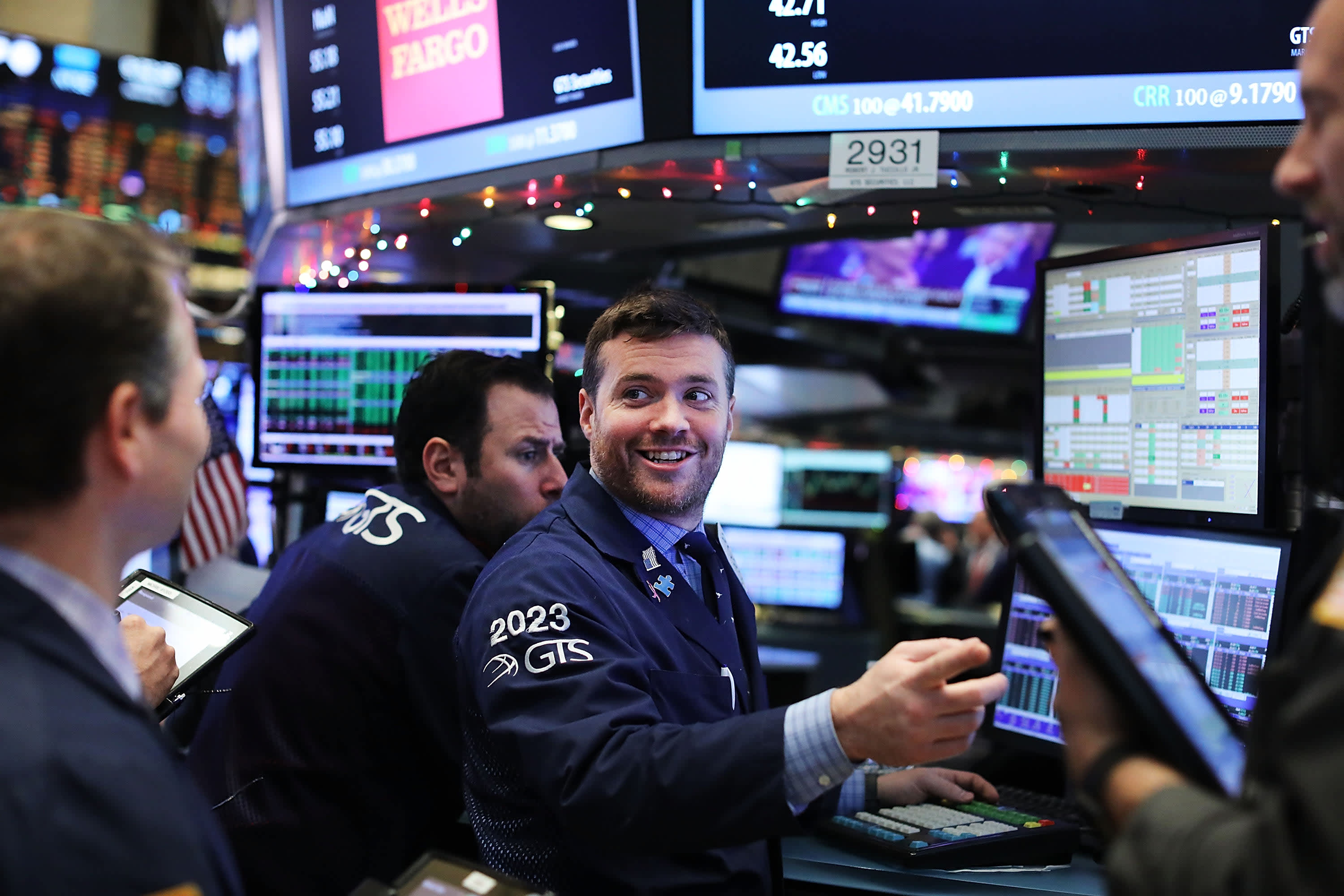Dow surges 400 points as Fed signals it will help economy if needed, trade tensions ease - 4 minutes read

Stocks surged on Tuesday, climbing back from a big rout in the past month, after Federal Reserve Chairman Jerome Powell signaled the central bank was open to easing monetary policy to save the economy and as trade tensions eased amid comments by China and Mexico.
The Dow Jones Industrial Average climbed 400 points, or 1.7%. The S&P 500 jumped 1.5% and the Nasdaq Composite jumped 1.7%. Stocks that have been hit hard during the month-long sell-off led Tuesday's comeback, including Apple and bank shares.
Powell said the central bank will "act as appropriate to sustain the expansion." He noted, however, the Fed does not know "how or when" global trade issues will be resolved. "We are closely monitoring the implications of these developments for the U.S. economic outlook."
These comments come amid increasing expectations for a Fed rate cut. The CME FedWatch tool indicated a 90% chance of a September rate cut. Expectations for a second rate cut in December were also above 80%.
"We find the impact of Trump's trade war and more broadly a shortening timeline for the Fed's impending 'insurance cut,'" Steven Blitz, chief U.S. economist at TS Lombard, wrote in a note. "Even if Trump ends it more quickly than currently anticipated, the lagged impact of tight money (as indicated by the curve late last year) now meeting up with fading fiscal stimulus suggests a cut is warranted sooner than later."
Trade tensions ease
The Chinese Commerce Ministry said in a post that the "differences and frictions between the two sides" should dealt with through talks, according to a Google translation. But the post also said talks "need to be based on mutual respect, equality and mutual benefit."
Traders work on the floor of the New York Stock Exchange in New York City.
Getty Images
Wall Street took the comments as a sign maybe the country was easing up on its tough rhetoric of the last month. The U.S. and China hiked tariffs on billions of dollars worth of each other's goods in May, sparking worries of a prolonged trade war.
The Trump administration also threatened to slap tariffs on all imports coming from Mexico, adding to those concerns. Those worries were assuaged after Mexican Foreign Minister Marcelo Ebrard said Tuesday he expects both countries to find common ground on immigration and trade.
Republican lawmakers are also discussing whether they may have to vote to stop the new tariffs on Mexican goods threatened by Trump, according to The Washington Post, citing people familiar with the matter. The report said GOP lawmakers are worried about the ramifications for businesses and consumers of the tariffs.
"Perhaps the market was looking for any incremental news on trade. It started with that Washington Post story to create this bounce or reflex rally," said Hank Smith, co-CIO at Haverford Trust. "We're in for a choppy summer."
Shares of GM and Ford, companies who could take a hit under the new tariffs, rose 4.3% and 3.2%, respectively.
Tuesday's moves come after the major indexes took a hit in the previous session amid worries over tougher regulations on big tech companies. The Nasdaq fell into correction territory, pressured by Alphabet, Amazon, Facebook, and Apple. Amazon, Alphabet, and Apple rebounded on Tuesday. Facebook shares slipped 1.7%, however.
The 10-year Treasury note yield rose, after reaching its lowest level in 20 months on Monday. Yields have fallen sharply over the past month as investors worry that tighter trade conditions could lead to slower economic growth. The 10-year note traded at 2.13%.
Bank shares rose broadly as yields climbed. Citigroup, Morgan Stanley and Bank of America all traded at least 3.5% higher. Goldman Sachs and J.P. Morgan Chase rose 3.2% and 2.8%, respectively.
Investors also focused on monetary policy this week, with a flurry of Federal Reserve officials speaking on Tuesday.
Governor Lael Brainard and Dallas Fed President Robert Kaplan are both scheduled to speak later on Tuesday.
—CNBC's Sam Meredith contributed to this report.